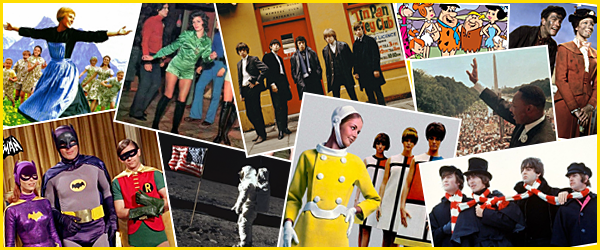


The 60s Rules Buttons Join Fans Update Home
In the United States and other Western countries, the Sixties is noted for its counterculture. There was a revolution in social norms, including clothing, music (such as the Altamont Free Concert), drugs, dress, sexuality, formalities, civil rights, precepts of military duty, and schooling. Others denounce the decade as one of irresponsible excess, flamboyance, the decay of social order, and the fall or relaxation of social taboos. A wide range of music emerged; from popular music inspired by and including the Beatles (in the United States known as the British Invasion), the folk music revival, to the poetic lyrics of Bob Dylan. In the United States the Sixties were also called the "cultural decade" while in the United Kingdom (especially London) it was called the Swinging Sixties.
Organizations such as those present at May 1968, the German Red Army Faction, and the Japanese Zengakuren tested liberal democracy's ability to help people left out of society in the post-industrial age hybrid capitalist economies. In the United Kingdom, the Labour Party gained power in 1964 with Harold Wilson as Prime Minister through most of the decade. In France, the protests of 1968 led to President Charles de Gaulle temporarily fleeing the country. Italy formed its first left-of-center government in March 1962 with a coalition of Christian Democrats, Social Democrats, and moderate Republicans. When Aldo Moro became Prime Minister in 1963, Socialists joined the ruling block too. Soviet leaders during the decade were Nikita Khrushchev until 1964 and Leonid Brezhnev. In Brazil, João Goulart became president after Jânio Quadros resigned.
The United States had four presidents that served during the decade; Dwight D. Eisenhower, John F. Kennedy, Lyndon B. Johnson and Richard Nixon. Eisenhower was near the end of his term and left office in January 1961, and Kennedy was assassinated in 1963. Kennedy had wanted a Keynesian and staunch anti-communist social reforms. These were passed under Johnson including civil rights for African Americans and healthcare for the elderly and the poor. Despite his large-scale Great Society programs, Johnson was increasingly disliked by the New Left at home and abroad. For some, May 1968 meant the end of traditional collective action and the beginning of a new era to be dominated mainly by the so-called new social movements.
After President Kennedy's assassination, direct tensions between the superpower countries of US and Soviet Union developed into a contest with proxy wars, insurgency funding, puppet governments and other overall influence mainly in Latin America, Africa, and Asia. This "Cold War" dominated the world's geopolitics during the decade. In Africa was in a period of radical political change as 32 countries gained independence from their European colonial rulers. The heavy-handed American role in the Vietnam War lead to an anti-Vietnam War movement with outraged student protestors around the globe.
By the end of the 1950s, post-war reconstructed Europe and began an economic boom. World War II had closed up social classes with remnants of the old feudal gentry disappearing. A developing upper-working-class (a newly redefined middle-class) in Western Europe could afford a radio, television, refrigerator and motor vehicles. The Soviet Union and other Warsaw Pact countries were improving quickly after rebuilding from WWII. Real GDP growth averaged 6% a year during the second half of the decade; overall worldwide economic prospered in the 1960s with expansion of the middle class and the increase of new domestic technology.
Source: Wikipedia.org